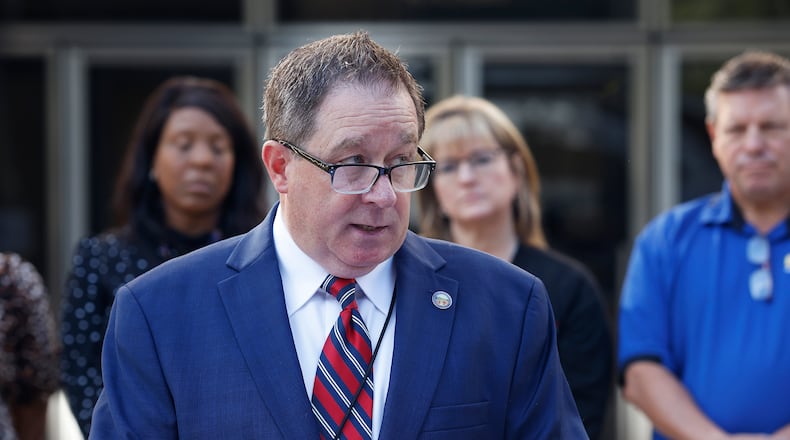Judge Jonathan Hein, appointed by the Ohio Supreme Court to oversee Foley’s case, granted Foley’s request to withdraw his plea Wednesday, vacating his criminal sentence and reinstating previously dismissed felony counts against the elected official.
Hein also unsealed Foley’s motion to withdraw his plea, making the document publicly accessible for the first time on Thursday.
Foley pleaded no contest to felony and misdemeanor charges on June 16 as part of a plea bargain with the Ohio Auditor of State’s Office and was subsequently convicted and sentenced. The next day, his attorneys filed the motion to exit that agreement.
In the plea withdrawal motion, attorney Jon Paul Rion writes that the “spirit of the plea agreement was that there were to be no collateral consequences that would cause Mr. Foley to be disqualified from holding his political office or maintaining his position as the Montgomery County Clerk of Courts.”
Foley in June pleaded no contest — meaning he neither admitted to or denied allegations against him — to a felony charge of misuse or unauthorized use of a computer and a misdemeanor charge of solicitation of campaign contributions.
Rion argued that a section of the Ohio Revised Code details the impact of felony convictions on a person’s eligibility to hold a public office makes it “clear that an unintended collateral consequence would be the disqualification” of Foley.
“The State and Defense are in agreement that this invalidates the terms of the plea agreement,” Rion wrote.
The entry of waiver and plea, which details the agreement between Foley and the state, does not explicitly mention any negotiations about Foley’s employment. During his June 16 plea change and sentencing hearing, Foley’s attorney said their negotiations with the state included discussion about avoiding “collateral consequences.”
“Clearly it was not intended by either party that the limited misuse of a copying machine by a third party would affect a successful career,” Rion wrote in his plea withdrawal request.
Foley in 2024 was indicted on a dozen counts: attempted unlawful interest in a public contract, three counts of complicity to commit unlawful interest in a public contract, two counts of theft in office, one count of unauthorized use of computer, cable or telecommunication property, and misdemeanor counts of solicitation of political contributions from public employees and prohibition against partisan political activity.
Many of these charges were dropped in the now-vacated plea agreement, but they were reinstated on Wednesday. Foley’s case was reopened by the Montgomery County Common Pleas Court.
Indicted alongside Foley in 2024 was ex-Montgomery County Municipal Judge James Piergies. Piergies changed his plea to guilty in May as part of a plea bargain with state investigators. Hein sentenced him to up to two years of community control and 75 hours of community service. A 90-day jail sentence is suspended based on compliance with the community control sanctions. Piergies is also ordered to pay court costs and a $750 fine.
The plea deal required Piergies to resign from office.
About the Author

